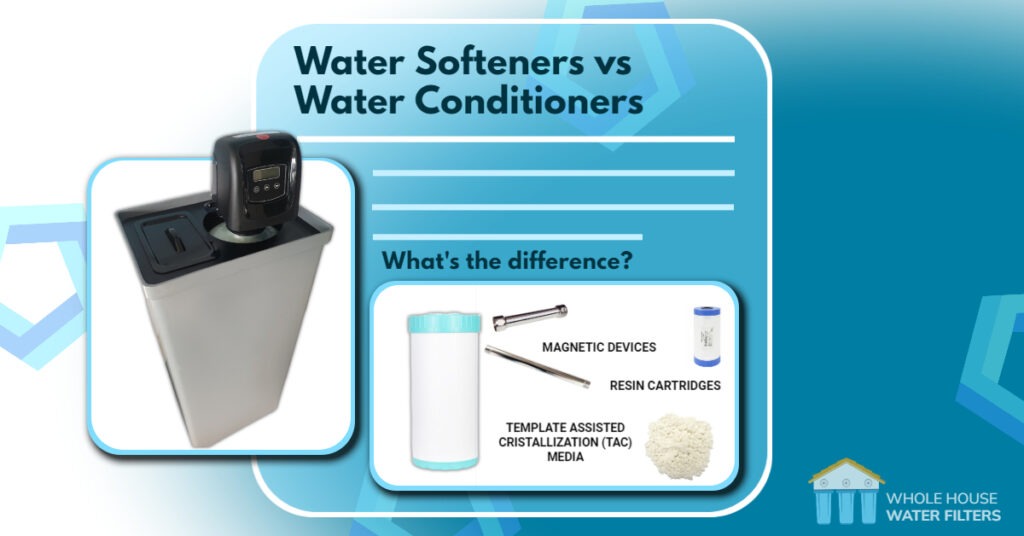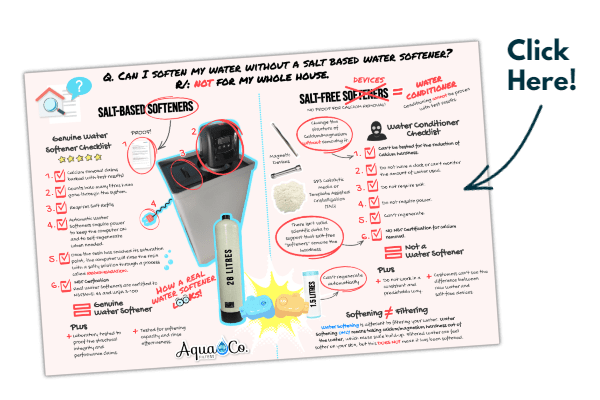Water Conditioners, Water Softeners, Whole House Water Filtration System
Water Softeners vs Water Conditioners: What’s the difference?
Water Softeners and Water Conditioners are both designed to treat hard water, but they work differently and have distinct features. Here are five differences between them:
- Principle of Operation:
- Water Softener: Water softeners use a process called ion exchange to remove calcium and magnesium ions responsible for water hardness. These ions are exchanged for sodium or potassium ions, softening the water.
- Water Conditioner: Water conditioners use physical or electromagnetic methods to alter the structure of the minerals in hard water. They do not remove the minerals but change their behaviour to reduce scaling and other issues.
- Mineral Retention:
- Water Softener: Water softeners remove calcium and magnesium ions from the water, effectively reducing the hardness. This results in the water feeling noticeably “slick” or “slippery.”
- Water Conditioner: Water conditioners do not remove minerals but prevent them from forming scale and sticking to surfaces, thus reducing the negative effects of hard water.
- Maintenance and Regeneration:
- Water Softener: Traditional water softeners require periodic regeneration to replenish the sodium or potassium ions used during the softening process. This regeneration process uses water and salt.
- Water Conditioner: Water conditioners generally do not require maintenance or regeneration, making them more cost-effective in the long run.
- Installation and Space Requirements:
- Water Softener: Traditional water softeners are bulkier and require more space due to the need for a resin tank and brine tank for regeneration.
- Water Conditioner: Water conditioners are typically compact and don’t require additional tanks, making them suitable for smaller spaces.
- Certifications & Removal Claims:
- Water Softener: Certified and laboratory tested to prove structural integrity and performance claims. Claims backed with test results.
- Water Conditioner: No proof for calcium removal. Performance cannot be proven with test results.
Download Your Water Softener Checklist!
Discover The 6 Essential Features Your NEW Water Softener Should Have!
Stay Informed: Check Your Local Water Quality Reports!
- Perth Water Quality
- Sydney Water Quality
- Melbourne Water Quality
- Adelaide Water Quality
- Brisbane Water Quality
Keep in mind tap water is only tested at the reservoir and doesn’t take into account all the contamination that occurs during its travel to your home.
Helpful Links:
- Water Quality Association (WQA): The WQA is a renowned organization that provides certifications for water treatment products, including water softeners. You can visit their website to learn about their certification programs and find a list of certified water softeners. Website: https://www.wqa.org/
- National Sanitation Foundation (NSF International): NSF International is another prominent organization that offers certifications for water treatment products, ensuring they meet specific standards. You can search for certified water softeners on their website. Website: https://www.nsf.org/
- American National Standards Institute (ANSI): ANSI accredits organizations that develop product standards, including those related to water treatment. You can check their website to find accredited certification programs for water softeners. Website: https://www.ansi.org/



